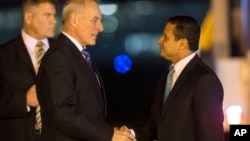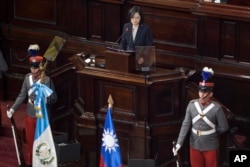The remaining Central American allies of Taiwan on Tuesday offered guarded responses to Panama's decision to embrace the "One China" policy and switch allegiance to Beijing, deflecting the question of whether they could follow suit.
On Monday, Panama said it had broken with Taiwan to forge ties with Beijing, in a major victory for China's efforts to isolate the island it views as a renegade province.
Following Panama's departure from the fold, Taiwan has full ties with 20 countries - several of them in Central America, where Taiwanese economic aid has helped support a region that relies heavily on agriculture and struggles with law and order.
The most populous of those, Guatemala, declined to comment on its future with Taiwan.
"We don't have an official position on this. It's a matter that concerns other countries," Guatemalan Foreign Minister Carlos Morales told Reuters when asked if his country would go down the same path as Panama with China.
Guatemala, which retains diplomatic ties with Taiwan, declined comment on Tuesday on its future relations with the island following Panama's decision to recognize "One China" and establish diplomatic ties with Beijing.
Guatemala's foreign minister Carlos Morales told Reuters his government would make no comment on Panama's break with Taiwan when asked if Guatemala would do the same.
“We don't have an official position on this. It's a matter that concerns other countries,” he said.
On Monday, Panama said it had broken with Taiwan in favor of establishing ties with Beijing, in a major victory for China's efforts to isolate the island it regards as a renegade province.
Taiwanese President Tsai Ing-wen went to Guatemala in January during a visit to a clutch of Central American allies.
Her Guatemalan counterpart, Jimmy Morales, said at the time he expected Taipei to deepen ties with the region.
Neighboring El Salvador said it had no plans to enter into new ties with other governments.
"Right now, the establishment of diplomatic relations with [other countries] is not on my radar," Foreign Minister Hugo Martinez told reporters after a fund-raising event that focused on Taiwanese investment for projects in the country.
El Salvador has had formal diplomatic relations with Taiwan since 1933 and also maintains trade ties with China.
Tsai began her January visit in Honduras, where a government official also said on Tuesday the Honduran administration would make no official comment on the shake-up in Panama.
Speaking on condition of anonymity because he was not authorized to speak publicly, the official said Honduras was maintaining its diplomatic and commercial relations with Taiwan.
Since 2006, Taiwan has loaned Honduras some $205 million and donated another $27 million, including an Embraer Legacy 600 jet used as the president's official plane. Taiwan also has provided the country with a wide range of agricultural assistance.
Tsai also visited Nicaragua on her trip but she did not stop at Panama. Nicaragua's government did not immediately respond to a request for comment on Panama's move.
"Relations between Taiwan and Nicaragua are very solid," especially since Tsai's visit, said Taiwanese-born Nicaraguan businessman Gilberto Wong, highlighting Taiwan's investment.
After the visit, a high-level Nicaraguan delegation led by Foreign Minister Denis Moncada went to Taipei in April and agreed on new investment projects Taiwan would finance.
Still, Robert Manning, an Asia expert and senior fellow at the Atlantic Council, said China was gradually extending its influence in Latin America and that pressure was likely to continue to rise on countries to switch sides.
"The weight of China is being felt in many places and not just in Latin America," Manning said. "The trend line is moving in that direction."






